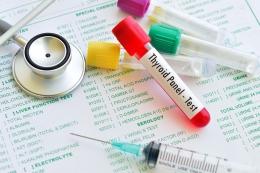Thyroid Imbalances - Everything You Should Know
The thyroid is an endocrine gland located at the base of the neck, just below the Adam’s apple. It appears to be divided into a right and a left lobe, each about the size of a plum split into two. The two lobes are connected by a group of thyroid tissues called isthmus.
The thyroid gland produces two hormones that are released into the bloodstream. One is called triiodothyronine (T3), which is made up of 3 iodine atoms. The other is Thyroxine (T4), and it’s made up of 4 iodine atoms. Once in the body, T4 is converted into T3 and it’s this T3, either synthesized from T4 or secreted by the thyroid gland directly as T3 that is biologically active. T3 is primarily needed for the proper functioning of body cells, but it also influences bone formation, muscles, heart health, and cholesterol levels.
Thyroid Imbalances
Thyroid Imbalances are more prevalent in women, but anyone (including babies, children, and teenagers) can be affected. About 5% of the global population suffers from either permanent or temporary thyroid problems.
Thyroid imbalances vary from the small and often harmless goiter that doesn’t need medical attention to life-threatening disorders such as cancer. However, the most common type of thyroid disorders involves either overproduction or underproduction of the T3 hormone. Excess production of the thyroid hormone results in hyperthyroidism while inadequate amount causes hypothyroidism.
Although the symptoms of both hypothyroidism and hyperthyroidism can be uncomfortable and unpleasant, they can be managed if proper diagnosis and treatment is done.
Note that treatment of thyroid imbalances does not always have to take the form of medical options. There are some nutritional supplements that have been shown to cure thyroid imbalances, and can also be used to prevent thyroid disorders. We will discuss these supplements later in this article, but first things first, let’s discuss the two type of thyroid imbalance; their causes, and symptoms.
Hyperthyroidism
Overproduction of T3 can speed up numerous physiological activities in the body, throwing them out of normal conditions. As a result, one may experience high heartbeat, weight loss, abnormal sweating, or feel moody and nervous.
The most common hyperthyroidism symptoms include:
-
Feeling moody, tired, weak or nervous.
-
Higher heart rate, shaking hands, and/or breathing problems.
-
Feeling hot, or red, itchy skin.
-
Abnormally high bowel movement.
-
Fine, and soft to touch hair that’s falling out.
Causes of Hyperthyroidism
Grave’s disease
In most cases, hyperthyroidism is caused by Grave’s disease. In patients with Graves’ disease, the immune system attacks the thyroid gland, triggering it to react with overproduction of T3 and T4. Like most thyroid disorders, it is inheritable.
Thyroid Nodules
Hyperthyroidism can be triggered by small growths called thyroid nodules. Although they are less common, an overactive thyroid can result if nodules (some sort of lumps) develop in the thyroid. Thyroid nodules are usually non-cancerous, but they are packed with thyroid tissue causing excessive production of thyroid hormone.
It’s not clear what triggers development of thyroid nodules, but research has shown they are more prevalent in people over 60 years of age.
Medication
If you are taking medication that is rich in iodine, for example amiodaron, a drug that is often used to regulate arrhythamia (irregular heart rate), you may develop hyperthyroidism. A hyper active thyroid caused by medication improves as soon as the medication is stopped but it may take months for your body thyroid levels to stabilize.
Other common causes of hyperthyroidism include:
High level of human chorionic gonadotrophin hormone – this often occurs during molar pregnancy, multiple pregnancy, or early pregnancy.
Pituitary Adenoma – This refers to a benign tumor in the pituitary gland (a gland on the base of the brain and which affects production of the thyroid hormone).
Thyroiditis – Refers to inflammation of the thyroid gland. Thyroiditis may cause overproduction of the thyroid hormone.
Thyroid Cancer – Although it’s rare, a cancerous tumor of the thyroid can trigger overproduction of the thyroid hormone.
Hypothyroidism
Hypothyroidism, sometimes called the underactive thyroid disorder, is a common health disorder. In patients with hypothyroidism, the thyroid gland fail to secrete sufficient amounts of T3 and T4.
The thyroid hormone regulates metabolism (how your body utilizes energy). As such, if the thyroid gland fails to produce sufficient amounts of the thyroid hormone, metabolism slows down. In simpler terms, your body synthesizes less energy.
Symptoms of Hypothyroidism
The specific symptoms of hypothyroidism are vague and often they resemble other conditions. They include:
-
Hair loss and/or dry hair.
-
Irregular periods
-
Depression
-
Constipation
-
Fatigue
-
Dry skin
-
Slow heart rate
-
Greater sensitivity to low temperature
-
Swelling of the thyroid gland
-
Carpal tunnel syndrome
-
Unexplained weight gain.
Causes of Hypothyroidism
Most instances of hypothyroidism can be attributed to Hashimoto’s thyroiditis; an auto immune response in which your body produces antibodies that fight and destroy the thyroid gland. Other common causes of hypothyroidism include:
Radiation therapy to the neck area: Treatment of various types of cancers, for example lymphoma, involves radiation therapy to the neck. However, radiation therapy inevitably destroys some cells in the thyroid gland, which may in turn cause underproduction of the thyroid hormone.
Radioactive Iodine Treatment (RIT): RIT is often used to treat hyperthyroidism. However, radiation damages cells in the thyroid gland leading to hypothyroidism.
Medication: Use of certain types of medication to manage or cure heart disorders, cancer and psychiatric conditions can often impact production of the thyroid hormone. Some of the drugs that have been shown to cause hypothyroidism include interferon alpha, interleukin-2, amiodarone and lithium.
Thyroid Surgery: In some cases, a surgery may be needed to remove the thyroid. If just a small part of the thyroid is removed, the thyroid may still secrete sufficient amount to meet body requirements.
Other common causes of hypothyroidism include:
-
Taking a diet low in iodine.
-
Pregnancy.
-
Problems with thyroid during birth.
-
Pituitary gland disorder or damage.
Who Is at Risk of Hypothyroidism
-
Women, and more so older women, are likely to develop hypothyroidism. One is also more likely to develop hypothyroidism if he or she comes from a family with a member who suffers from an autoimmune disorder. Other factors that increase one’s risk of developing hypothyroidism include:
-
Age, the older one gets, the more likely he or she is to develop hypothyroidism.
-
Race (Asian or white).
-
Autoimmune problems such as multiple sclerosis, rheumatoid arthritis, Addison’s disease, celiac disease or vitiligo.
-
Down syndrome
-
Turner syndrome
-
Bipolar disorder.
-
Prematurely graying hair.
How Thyroid Complexes/Supplements Alleviate Thyroid Imbalances Symptoms
The best supplements for thyroid imbalances are enriched with specific nutrients and vitamins that the thyroid requires for optimal performance. According to Raphael Kellman, a doctor and the author of the book titled ‘The Microbine Diet.’, “Nutrients and vitamins can also help one to fight thyroid disorders, such as inflammation and autoimmune processes and improve the performance of a dysfunctional thyroid.”
The specific vitamins and minerals that have proven effective against hypothyroidism include:
Iodine: One needs adequate amount of iodine to manufacture the thyroid hormone. The recommended daily intake is 150 micrograms per day. Some of the best sources of dietary iodine include eggs, poultry, milk, cheese, sea weeds, and kelp. However, be careful while supplementing with iodine as too much of it can lead to hypothyroidism or worsen it if already existing.
Vitamin B: Vitamin B supplementation is crucial for individuals with hypothyroidism, mainly because B vitamins have numerous interactions with the thyroid and hormone regulation in the body as a whole. Great sources of B vitamins include seeds, dark leafy greens, yogurt, legumes, whole grains, nuts, and milk.
Selenium: This micronutrient is required for synthesis of thyroid hormone and to boost metabolism. Some of the best sources of dietary selenium include shitake mushrooms, beef, chicken, turkey, scallops, tuna, salmon, and shrimp. Doctor Kellman say it’s okay to consume 100-200 micrograms of selenium per day.
Zinc: Together with selenium, zinc play a vital role in conversion of T4 into the bioactive T3. Some good sources of zinc include mollusks, shellfish, nuts, legumes, and meat. A zinc supplement of 30 milligrams per day is great.













































































Leave a comment